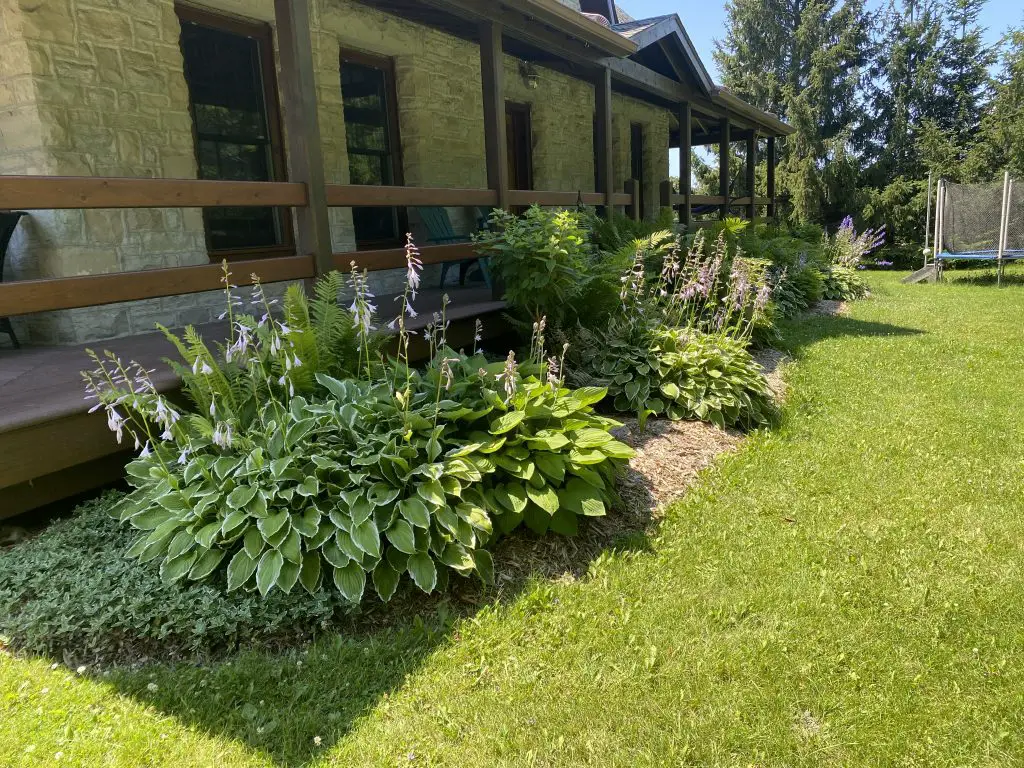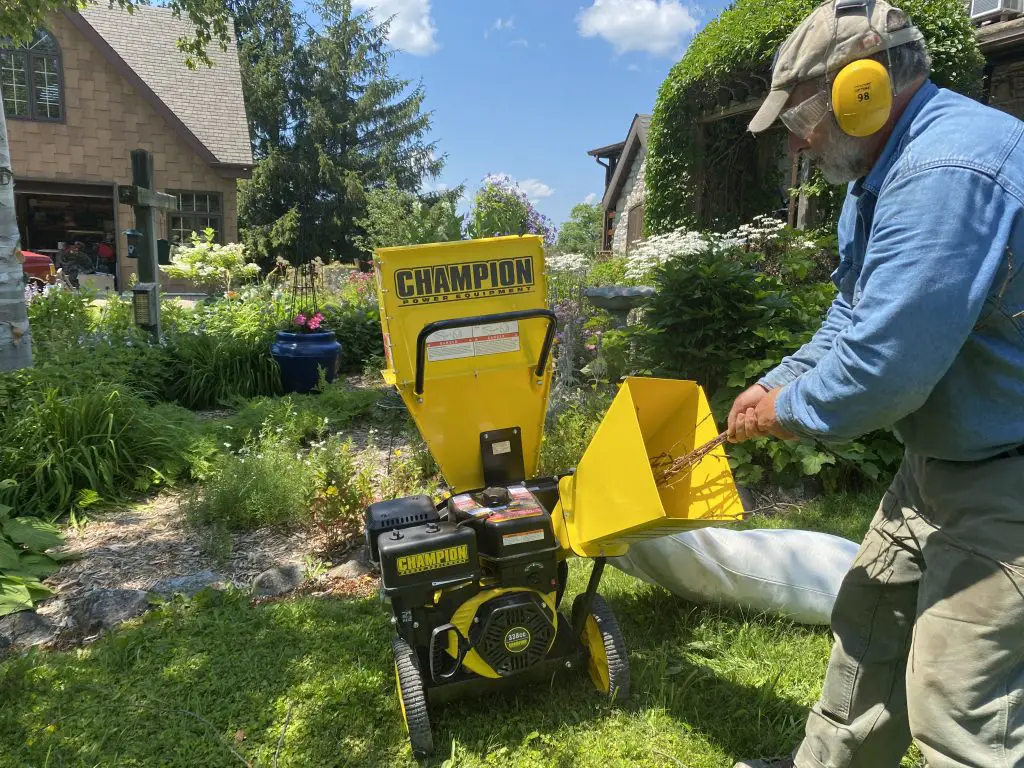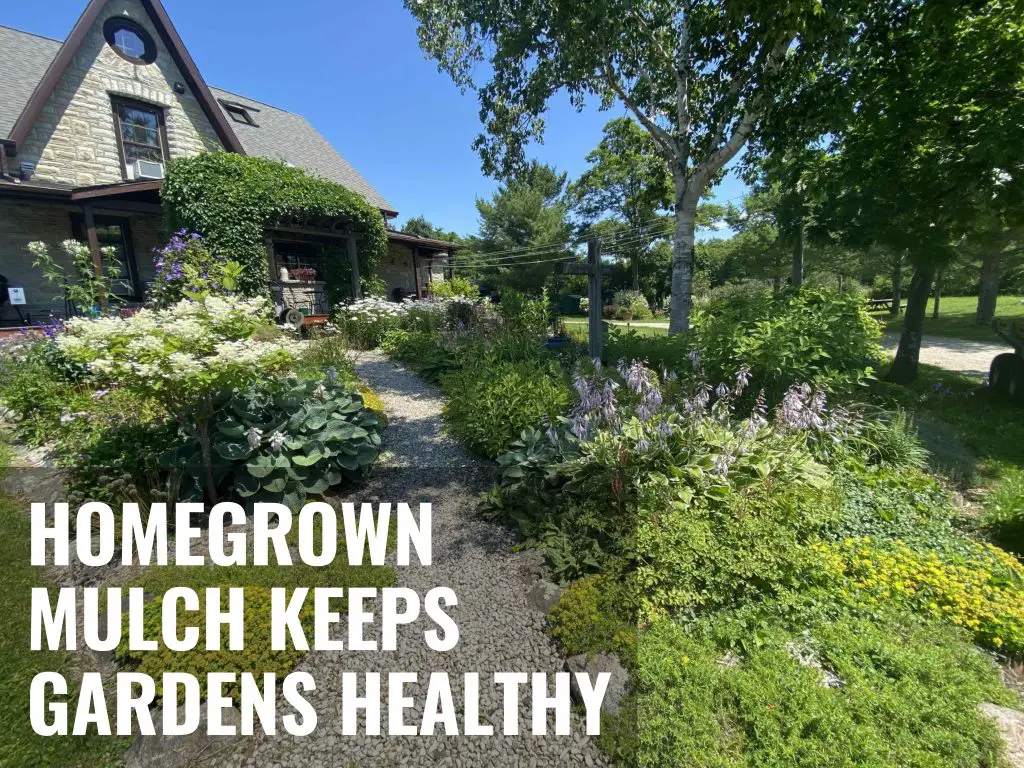My wife and I have been gardening together for almost 40 years and one thing I’ve noticed is the tremendous value of mimicking nature in specific ways. Mulching is perhaps the clearest example. In the same way that Nature almost always covers soil with some kind of leaf litter or ground cover, you’ll get amazing benefits doing the same thing in many of your gardens, especially perennial gardens.
- Reading Time = 4 1/2 minutes
Mulching can also let you close the loop when it comes to making use of the branches, leaves and nutrients that every yard produces, turning troublesome waste into a valuable resource. That’s what we do at our place and it all comes down to an outdoor machine called a chipper. Watch the video at the end of this article to see one in action, but first that let me tell you more about mulch.
We maintain more than a thousand square feet of perennial gardens at our country home on Manitoulin Island, Canada, and these gardens never get tilled, dug or first (okay, maybe the occasional weed, but they pull easily). We don’t have to wrestle to keep the weeds at bay because the constant layer of 3” to 4” of compacted mulch we maintain on the soil prevents weeds from ever growing, though that’s just one of the benefits. Retaining water and constantly increasing nutrient and organic matter levels are another advantage of a continuous cover of mulch. Simply put the mulch on top of the soil without digging it in, and you’re done.

If you added it all up, most of our gardens have digested a total of two or three feet of solid, compacted wood chip mulch over the decades and it shows. The organic matter content of our perennial garden soil is a whopping 8%, compared with the 3% organic matter levels in the same soil in our pasture fields that have not been mulched. Nutrients also take care of themselves with constant mulching (we never fertilize and yet have big, luxurious plants). Then there’s moisture retention. If we experience a rip-roaring drought in our area (and we do sometimes), our mulched perennial beds are the last to show the strain. Mulching also offers another benefit, one that lightens the load on landfills.
A vital key to making mulch a regular part of your gardening life is having a ready source of mulch. Many people buy bags of mulched cedar bark or other materials but there are two problems with this. First, bagged mulch is expensive given how much is required for even a small garden. And second, bagged mulch does nothing to stop the outflow of nutrients and organic matter leaving your yard and property and going to waste. To make something different happen you need something to produce mulch from the varied sources of garden waste you produce in your yard. This is one reason they invented a gas-powered machine called a chipper/shredder.

Take tree branches, leaves, plant stalks, pine needles or any other kind of garden waste, feed this into a chipper/shredder and out comes finely chopped organic matter for your garden, ready to use. It’s a great thing. This is why some people call chipper/shredders “fertilizer machines” because they make unusable sources of garden waste into something you can apply to your garden and benefit from. Easy to roll out and handy to use, chipper/shredders can boost your gardening self-sufficiency and success. There’s no way we would ever have the gardening results we do without a constant 3” to 4”-thick layer of mulch.
My only warning is if you have walnut trees on your property. These contain a compound called juglone that inhibits the growth of all other plants. This is the walnut tree’s way of reducing competition, and that’s not what you want on your gardens. But the juglone hazard is not a big deal, and no deal at all if you have no walnut trees.
Besides the horticultural benefits, a chipper/shredder also makes it easier to keep your yard looking tidy. You can reduce the volume of garden waste by a factor of at least 10 by shredding and chipping, and you can do it as you produce the waste. No need to stockpile ugly heaps of branches, cuttings and clippings until the municipal pickup day happens, assuming it happens at all.
Watch the video below to see a full-featured chipper in action at my place, turning branches and garden prunings into useful garden amendments instead of going to waste.
 Did you find this article useful? I hope it helps you to garden better. Please consider helping me cover the cost of creating and publishing content like this. Click the “buy me a coffee” button below for a fast, safe and simple way to make a contribution. Thank you very much for helping to keep this website up and running.
Did you find this article useful? I hope it helps you to garden better. Please consider helping me cover the cost of creating and publishing content like this. Click the “buy me a coffee” button below for a fast, safe and simple way to make a contribution. Thank you very much for helping to keep this website up and running.
– Steve Maxwell




